At the height of her fame, buxom blonde Cleo Moore was going toe to toe against bombshells like Marilyn Monroe, Jayne Mansfield and Mamie Van Doren – and then she suddenly left Hollywood.
The actress died from a heart attack just a week shy of her 50th birthday. Unlike her contemporaries, Moore’s name has been seemingly forgotten with time, until now.
Actress Cleo Moore died from a heart attack in 1973. However, author Richard Koper wonders if she may have actually suffered from a broken heart. (Donaldson Collection / Getty Images / File)
Richard Koper has written a book on the late pinup titled “One Girl’s Confession – The Life and Career of Cleo Moore.” It explores her rise to stardom as “Louisiana’s Canary Blonde Bombshell,” how she became a muse to director Hugo Haas, and her tragic final years.
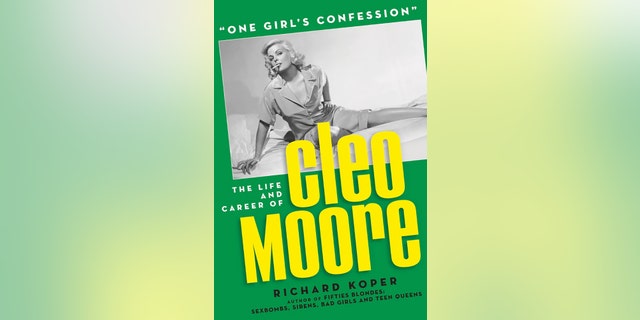
Richard Koper has written a book on the life of actress and pinup Cleo Moore. (BearManor Media)
“I was amazed by how determined Cleo Moore was to succeed in Hollywood, and yet there was so little information about her,” Koper told Fox News Digital. “The other blondes had big studios behind them. Cleo did everything herself. And unfortunately, she lost roles to Marilyn Monroe and the other blondes. Her films did get attention, and she was quite successful, but not with mainstream cinema. The other blondes got better publicity, better agents, better studios – that made all the difference.”
For the book, Koper tracked down several of Moore’s loved ones who remembered the starlet “lovingly” and were eager to share their memories.
“Cleo was determined to become someone,” said Koper. “I didn’t even know she had her own production company. Marilyn is always credited for launching her own production company, but Cleo did, too. I think the press rooted for her and saw her potential. She fought for everything in her life.”
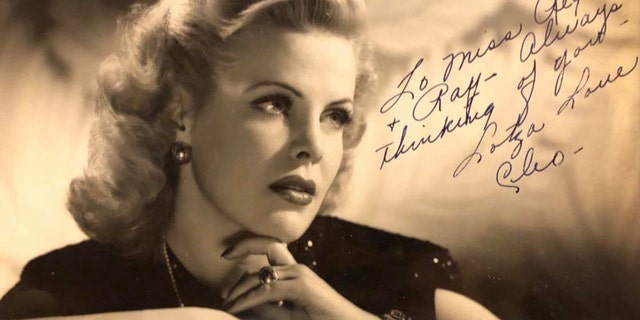
Cleo Moore, a Louisiana native, had big dreams of making it as an actress. She originally had planned a stage career in New York City, but she eventually found herself in Hollywood. (Courtesy of Richard Koper/Mrs. Hood-Duhe)
Moore’s early years were far from glamorous. The Louisiana native, born in poverty, had big dreams of seeing her name in lights. In 1944, the then-18-year-old married 21-year-old Palmer Reid, the youngest son of Gov. Huey Long. However, the marriage was annulled after six weeks. She later noted, “We were too young. But we were just stubborn and wouldn’t believe it when people told us that.”
According to Koper, Moore was eyeing a move to New York City to pursue theater. But with Los Angeles booming after World War II, her next stop turned out to be Hollywood.
CLICK HERE TO SIGN UP FOR THE ENTERTAINMENT NEWSLETTER
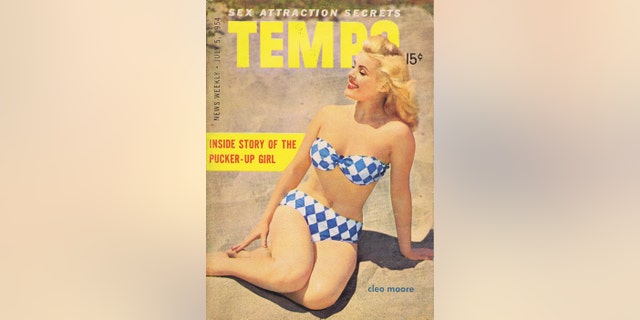
Cleo Moore became a sought-after actress and pinup during the ’50s, the era of the buxom blonde. (Courtesy of Richard Koper)
“Cleo connected with the right people,” said Koper. “She was witty, down to Earth and, of course, beautiful. She had a lot of talent and people recognized that quickly. But all the blondes in Hollywood auditioned for the same parts. They all dated talent agent Johnny Hyde, who, of course, was enamored with Marilyn Monroe. But all the people who worked with Cleo, the ones who are still alive, all said they enjoyed working with her. She was very likable and sweet. From cameramen to producers, she connected with them.”
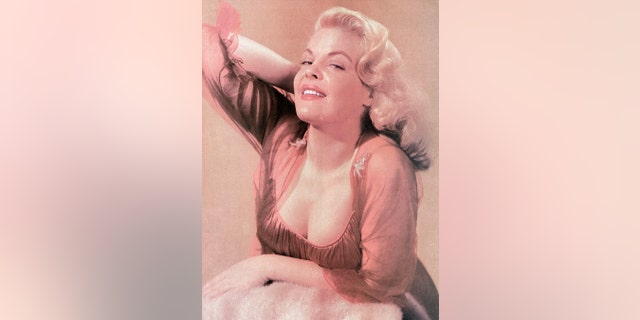
Cleo Moore was compared to Marilyn Monroe, but she was determined to stand out. (GAB Archive / Redferns)
Moore also dated Fox star Victor Mature, who helped Moore get in contact with the casting department at the studio. But as Moore’s popularity grew, it proved difficult to tip-toe out of one star’s shadow.
“Marilyn was always one or two steps before her,’ Koper explained. “But Cleo also said she really liked Marilyn. She remembered Marilyn as a sweet girl. She was never hateful or vengeful. She wished Marilyn all the best. But she was frustrated with the studios and the men who tried to copy-paste these impersonators. She wasn’t mad at Marilyn but rather at the system. They wanted to groom and pass her as a better substitute for Marilyn. I think she hated it for Marilyn as much as she hated it for herself. But she never spoke badly about Marilyn.”
Moore was chosen by director Hugo Haas to be his muse. She starred in seven of his films, including 1953’s “Thy Neighbor’s Wife” as well as 1954’s “The Other Woman” and “Bait.”
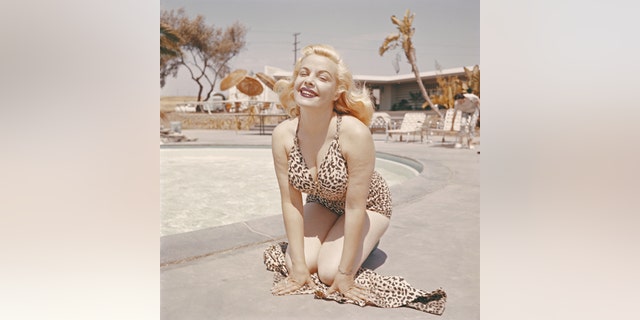
Cleo Moore was eager to make a big splash – and she did just that with her kissing stunt. (Archive Photos / Getty Images / File)
But Moore needed to make a major splash. And she did just that in 1954 by staging a televised kiss that lasted five minutes and 17 seconds. The stunt took place in Chicago while she was interviewed by Jack Eigen for his TV show to promote “Bait.” During the sit-down, the pair spoke about the imposed limits on film kisses. That’s when Eigen suggested that he and Moore lock lips. The smooch resulted in hundreds of complaints from viewers, who insisted the live incident was vulgar. Eigen refused to apologize and claimed he had approval from his wife of 18 years. Eigen was fired.
Moore later remarked that she received a letter from Eigen’s wife, saying that “he never kissed as good as that at home.”
“Cleo wasn’t afraid to push boundaries,” said Koper. “Since she was the only one creating publicity for her films, she crossed the line sometimes. She didn’t expect that the TV host would get fired. But she knew that kissing a married man on TV, on primetime, for that long would make headlines. And it worked.”
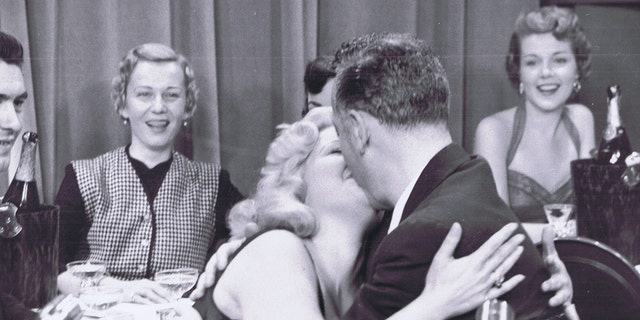
Cleo Moore and Jack Eigen’s kiss sparked hundreds of complaints from viewers. (Courtesy of Richard Koper)
Moore received shocking news – she was pregnant. According to the book, Moore “doubted who the father was.” It’s a scandal that would have destroyed her career. She quietly gave birth to a girl named Debra Lee. Moore’s 17-year-old sister, Jonnie Mae, was named the unwed mother of the child.
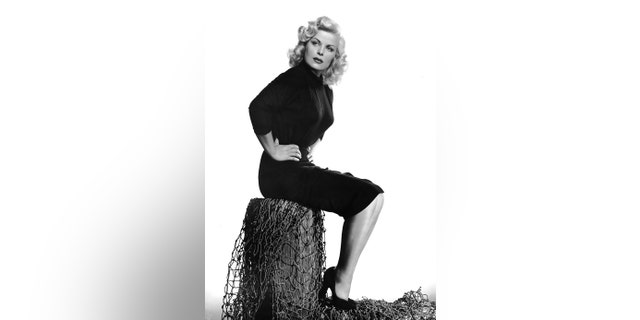
Cleo Moore quietly gave birth to a daughter and avoided public scandal. (Courtesy of Richard Koper)
“Cleo suddenly disappeared,” said Koper. “Her family stepped in to help because she was unmarried. It would have caused a huge scandal. … And in those days, there was no social media. You couldn’t check anything. You could say you’re five years younger or older. You could live with a lie and get away with it. A lot of these women in Hollywood had their secrets. And the truth is, Cleo wasn’t that big of a name like Marilyn, so it made it easier for her to vanish.”
According to Koper, Moore launched her own production company where she could make her own negotiations for films. But she was faced with new competition with more blondes like Kim Novak, Anita Ekberg and Diana Dors. She found herself being overlooked by producers who sought new, younger faces. By 1956, her career was over.
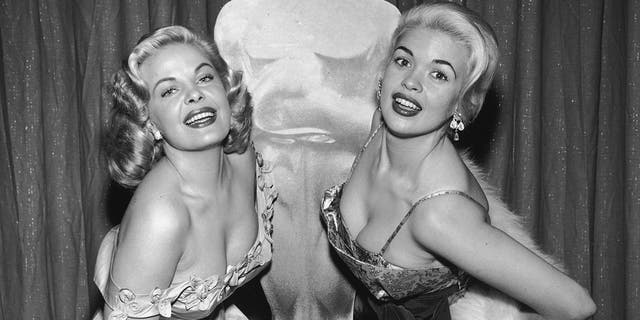
Cleo Moore, left, and Jayne Mansfield pose in front of an Oscar likeness at the Academy Awards circa 1956. (Hulton Archive / Getty Images / File)
“She wasn’t 26 anymore,” said Koper. “I think she was aware that her time was up, so she stepped back. But she kept trying. She had this fire in her to be this movie star. And it just didn’t happen the way she would have liked. I think she was very sad about that.”
In 1960, Moore announced that she would run for governor of Louisiana. The campaign was unsuccessful. In 1961, she married builder Herbert Heftler. According to the book, Debra was adopted by Moore after the marriage. Moore found success in real estate, but Koper suspected she may have felt unfulfilled.
FORMER ’50S STAR BARBARA PAYTON ENDURED A TRAGIC DOWNFALL INVOLVING DRUG ABUSE, ALCOHOLISM
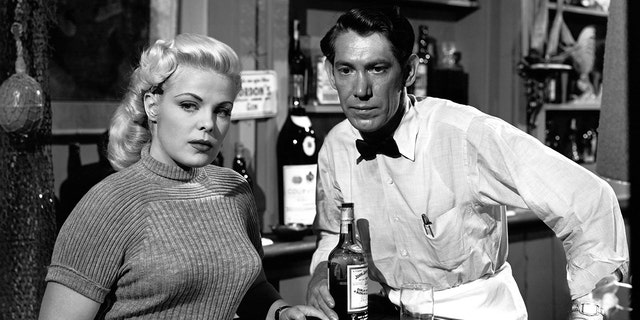
Actress Cleo Moore and Arthur Marshall are shown in a scene from the 1953 movie “One Girl’s Confession.” Richard Koper said Cleo Moore’s Hollywood career ended in 1956. (Donaldson Collection / Getty Images / File)
“I think during her final years, she was just unhappy,” Koper said. “These ladies from the ‘50s, by this point, were considered old-fashioned. They were ridiculed. And I think she was living in her own time bubble. I think there was a lot of disappointment that she couldn’t be this movie star. I also couldn’t get any photographs from her last years, which was very strange. It was as if she disappeared. Some relatives told me she stayed at home a lot.”
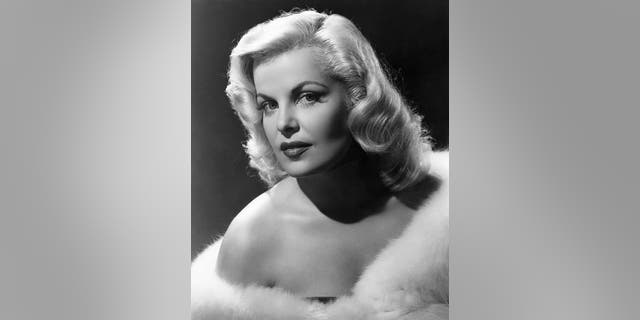
Richard Koper confirmed that Cleo Moore was born in 1923, which meant she was 49 at the time of her death. (Donaldson Collection / Getty Images)
According to the book, Moore spent much of her time in her bedroom, browsing through scrapbooks, reminiscing about her past. She would often listen to Elvis Presley or watch old films. In 1973, Moore sank into a deep depression after her mother died. Eight months after the matriarch’s passing, Moore was found unresponsive in her bedroom. She died from a heart attack at age 49.
“Cleo had a very strong bond with her mother,” said Koper. “Some people said she died of a broken heart, and it’s easy to see that. I spoke to some people who said she was very depressed, which was out of character because she was so lively and funny. I guess people can die from being unhappy. She was much too young when she died. And it’s interesting, when you look at these famous blondes, a lot of them died fairly young, too.”
Today, Koper hopes that his book will help today’s enthusiasts of old Hollywood films to discover Moore and her work.
KIM NOVAK EXPLAINS WHY SHE LEFT HOLLYWOOD: ‘I FELT LIKE I WAS LOSING MYSELF’
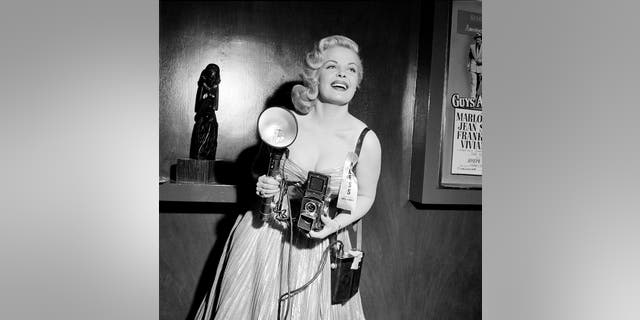
Richard Koper is hopeful that fans of old Hollywood films will discover Cleo Moore’s work today. (Earl Leaf / Michael Ochs Archives / Getty Images / File)
“I think it’s about the American dream, right?” said Koper. “The idea that you can achieve anything you want if you put your mind and heart to it. I think Cleo is an inspiration because she worked hard to be recognized by Hollywood in the ‘40s and ‘50s. She negotiated her own contracts. She had big dreams. She was serious about pursuing politics. And maybe that was part of the disappointment she faced. But I’m hoping now that people will discover the persona behind the star.”